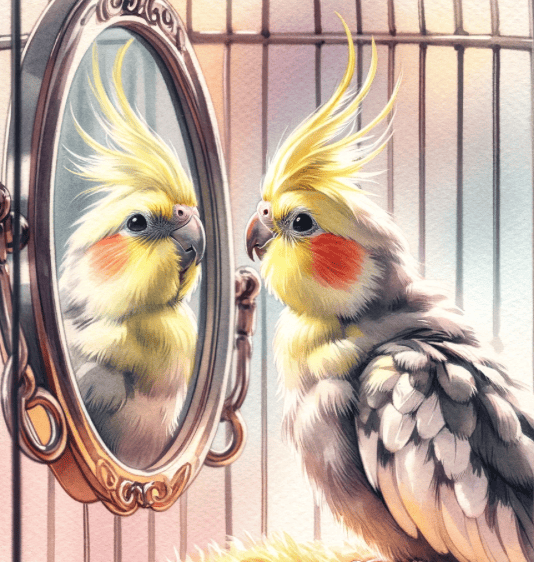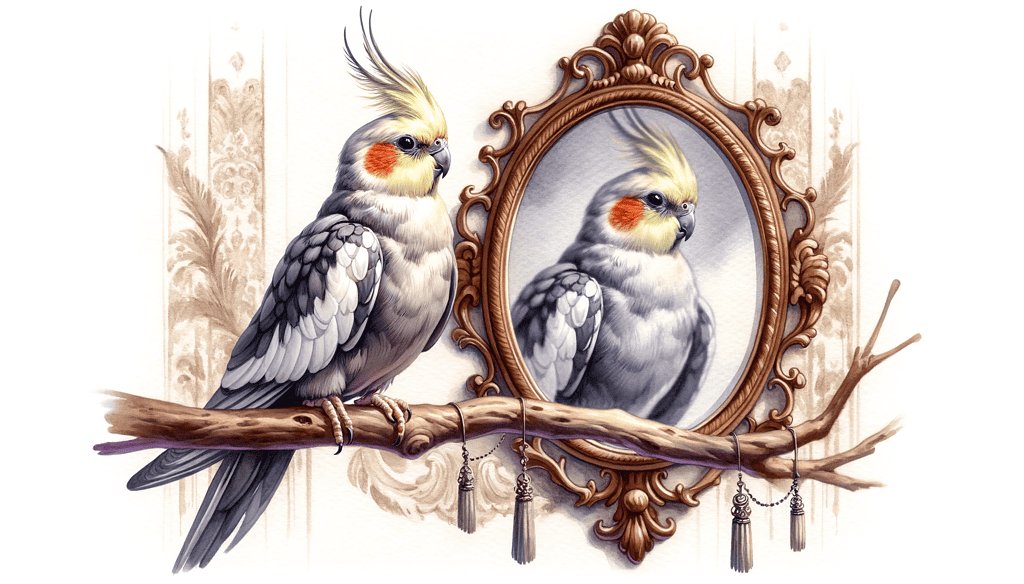
Mirrors have always been a subject of fascination, not just for humans but also for our feathered friends, cockatiels. Have you ever wondered why these birds are so captivated by their own reflection? What goes on in their minds when they gaze into a mirror?
As a general rule, cockatiels are drawn to mirrors due to their shiny surface and the reflection they see. However, they don’t recognize the reflection as their own, often perceiving it as another bird. This can lead to various behaviors, both positive and negative, depending on the individual bird and its environment.
Dive deeper into this article to understand the intricate relationship between cockatiels and mirrors, the benefits, potential concerns, and expert advice on introducing mirrors to your pet’s environment.
Can Cockatiels Recognize Themselves In A Mirror?
The simple answer is no. Cockatiels, despite being intelligent birds, do not possess the cognitive functions necessary for self-recognition in mirrors. When they look into a mirror, they see another bird, not their own reflection. This perception can lead to various behavioral responses, from curiosity to aggression.
Common beliefs and observations:
- Mirror Test: Cockatiels see the bird in the mirror as another bird, not a reflection of themselves. This can lead to various interactions, from curiosity to playfulness, and sometimes even aggression.
- No Self-recognition: The concept of self-recognition is complex, and cockatiels, like many other birds, do not recognize the reflection as themselves.
- Potential Bonding: For solitary cockatiels, the bird in the mirror can become a companion of sorts. They might bond with this “mirror cockatiel,” which can be both endearing and problematic.
- Mimicry and Confusion: While the cockatiel might be fascinated by the mimicking bird in the mirror, it can also be confounded by it. The reflection’s perfect mimicry of the cockatiel’s actions can be both stimulating and puzzling.
- Behavioral Implications: Due to their inability to recognize themselves, cockatiels might try to communicate with, play with, or even challenge their reflection. This can lead to behavioral issues, especially if the bird feels threatened or becomes obsessed with the “other” bird in the mirror.
The Attraction Of Mirrors To Cockatiels
Cockatiels, like many birds, are naturally drawn to shiny and eye-catching objects. This inherent attraction is one of the reasons why they are so fascinated by mirrors. When a cockatiel first encounters a mirror, it’s not just seeing a reflection; it’s discovering a captivating, shimmering object that seems to hold another bird within it.
There are several reasons why cockatiels are drawn to their reflection:
- Stimulation and Entertainment: Cockatiels are highly complex and social birds. They require a lot of stimulation to keep them engaged. Mirrors can serve as a source of entertainment, keeping them occupied and intrigued.
- Social Interaction: For a solitary cockatiel, a mirror can give the illusion of companionship. The bird in the reflection can become a pseudo-companion, offering a sense of social interaction.
- Curiosity: Birds are naturally curious creatures. The movement and mimicry of their reflection can be a source of endless fascination for them.
- Attraction to Shiny Objects: The reflective surface of the mirror is shiny and eye-catching, which can be inherently attractive to cockatiels.
- Mimicry: Cockatiels might be intrigued by the “bird” in the mirror that mimics their every move, leading to playful interactions.
Benefits Of Mirrors For Cockatiels

Mirrors can be a fascinating addition to a cockatiel’s environment, offering both entertainment and potential companionship. Here are some benefits of introducing mirrors to your cockatiel’s cage:
- Temporary Distraction: Mirrors can serve as a short-term source of entertainment for cockatiels, especially when they are left alone for brief periods. It provides them with a sense of company, even if it’s just their own reflection.
- Supervised Interaction: When you’re around, you can use the mirror as a playful tool, dancing it in front of your cockatiel or using it to reflect light, sparking their curiosity. This ensures that while they enjoy the mirror, you remain the primary focus of their attention.
- Distorted Reflections: To minimize confusion, consider using distorted mirrors. These mirrors won’t provide a clear reflection, making it less likely for your cockatiel to mistake the reflection for another bird. Instead, they can enjoy the play of light and colors without getting too attached or aggressive.
- Social Backup: For those who only have a single bird, a mirror can act as a temporary companion, especially during times when you might be too busy to interact with your cockatiel. It gives them a semblance of social interaction, even if it’s not the real thing.
- Curiosity and Mental Stimulation: The introduction of a mirror can be a new experience for your cockatiel, stimulating their curiosity and providing mental engagement as they try to understand and interact with their reflection.
Potential Dangers Of Mirrors For Cockatiels
Mirrors, while captivating for cockatiels, are not without their risks. As an experienced veterinarian, I’ve encountered numerous cases where the introduction of a mirror led to unforeseen challenges for both the bird and the owner. Let’s delve into some of these potential dangers:
- Risk of Physical Harm: Mirrors, especially those not designed for bird cages, can break or shatter. This poses a risk of injury, with the bird potentially cutting itself on the broken shards.
- Aggressive Behavior: Some cockatiels might become aggressive towards their reflection. This aggression can manifest in various ways, from pecking at the mirror to displaying territorial behaviors.
- Obsession with Reflection: A cockatiel might become obsessed with its reflection, spending hours interacting with the mirror. This obsession can lead to neglect of other activities, such as eating, drinking, or even interacting with its human companions.
- Increased Overall Aggression: Continuous interaction with a mirror can lead to heightened aggression in some cockatiels. They might become more territorial, not just with the mirror but with other objects or even their human caregivers.
How Often Should I Keep The Mirror In The Cage?
Mirrors, while fascinating for cockatiels, should be used judiciously. Their presence in the cage should be balanced to ensure the bird’s well-being.
Recommended Duration for Mirror Exposure Based on Different Scenarios:
| Scenario | Recommended Duration |
| When introducing a mirror for the first time | 10-15 minutes |
| During your short absences | 30 minutes to 1 hour |
| If the bird shows a positive reaction | Up to 2 hours |
| If the bird shows signs of stress or aggression | Remove immediately |
| As a regular toy in the cage | 1 hour daily |
Mirrors can be a great distraction, especially when you’re away for short periods. However, they should not become a permanent fixture in the cage. Using them intermittently can prevent potential behavioral issues.
Steps To Safely Introduce A Mirror To A Cockatiel’s Environment
- Choose a suitable location in the cage that’s easily accessible to the bird but not in its primary resting or feeding area.
- Opt for a bird-safe, non-breakable mirror to ensure safety.
- Introduce the mirror for short durations initially, gradually increasing the time based on your bird’s reaction.
- Observe your cockatiel’s behavior. If they show signs of stress or aggression, consider removing the mirror.
- Clean the mirror regularly to ensure it remains clear and safe for your bird.
Conclusion
The Relationship between cockatiels and mirrors is a fascinating one, filled with intrigue and varying behaviors. While mirrors can serve as a source of entertainment and temporary companionship, it’s crucial to monitor your bird’s interaction with them closely. The key is balance and understanding your cockatiel’s individual needs and behaviors.
Did you find this article helpful in unraveling the mystery of cockatiels and mirrors? We would love to hear your thoughts in the comments below. If you enjoyed this read, don’t hesitate to share it with fellow bird enthusiasts.
Frequently Asked Questions
Can cockatiels recognize themselves in a mirror?
No, cockatiels generally do not recognize their reflection as themselves. They often see the bird in the mirror as another bird.
Do cockatiels pass the mirror test?
Cockatiels do not pass the mirror test, indicating they don’t recognize their reflection as their own.
Why do some cockatiels become obsessed with mirrors?
Cockatiels might become obsessed with mirrors because they see the reflection as another bird, leading to emotional attachment or fascination.
How can I safely introduce a mirror to my cockatiel’s environment?
Ensure the mirror is securely attached, free from sharp edges, and placed in a location where the bird can easily access and interact with it without getting hurt.
